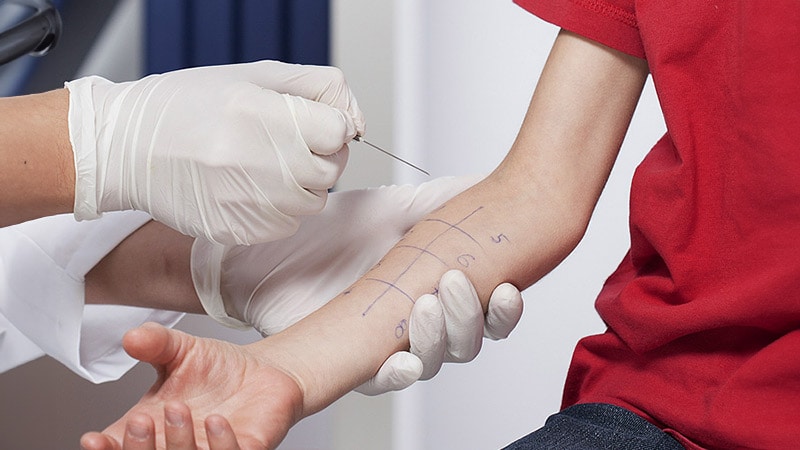Centrala begrepp
Appropriate testing and management are crucial in addressing suspected drug allergies.
Sammanfattning
The article discusses the importance of accurately diagnosing and managing suspected drug allergies, particularly focusing on penicillin allergies. It emphasizes the need for proper testing to confirm or rule out allergies, as mislabeling can lead to altered antibiotic management, infection risks, and antibiotic resistance. The content is structured into sections covering testing methods, substitution or desensitization strategies, and specific considerations for penicillin allergies. The core message highlights the significance of a systematic approach in dealing with drug allergies to ensure optimal patient care.
Testing Methods
Immediate hypersensitivity reactions involve symptoms appearing within 2 hours and resolving quickly.
Delayed hypersensitivity reactions manifest after 2 hours and last several days.
Testing methods include skin tests, prick tests, intradermal tests, and patch testing.
Substitution or Desensitization
Evaluating the risk-benefit ratio of the molecule and considering alternatives is crucial.
Desensitization protocols may be necessary when no alternatives exist.
The PEN-FAST scoring system aids in assessing patient-reported penicillin allergies.
Penicillin Allergy Considerations
The PEN-FAST+ score integrates criteria for delayed hypersensitivity reactions.
Challenge tests in hospital settings can help investigate suspected allergies in children.
Proper categorization of allergies can prevent unnecessary restrictions and improve infection management.
How Should Dermatologists Confront Suspected Drug Allergies?
Statistik
More than 20% of the population is suspected to have a penicillin allergy, yet less than 5% have this allergy.
The rate of cross-reactivity with penicillin is less than 2% for certain group A cephalosporins but 25%-35% for aminocephalosporins.
A score below three out of five in the PEN-FAST system indicates a risk of having a penicillin allergy of under 5%.
Citat
"Appropriate testing should be carried out to confirm or rule out the diagnosis."
"This type of protocol is more effective for cases of anaphylaxis than for drug eruptions."
"All doctors can contraindicate a medicinal product."
Viktiga insikter från
by Caroline Gui... på www.medscape.com 01-15-2024
https://www.medscape.com/viewarticle/how-should-dermatologists-confront-suspected-drug-allergies-2024a10000we
Djupare frågor
How can advancements in allergy testing technology improve the accuracy of diagnosing drug allergies?
Advancements in allergy testing technology, such as skin tests, prick tests, and intradermal tests, have the potential to enhance the accuracy of diagnosing drug allergies. These tests can help differentiate between immediate hypersensitivity reactions (immunoglobulin-E–mediated) and delayed hypersensitivity reactions (involving specific T lymphocytes), providing valuable information for healthcare providers. Additionally, the development of tools like the PEN-FAST penicillin allergy clinical decision rule can aid in point-of-care risk assessment, allowing for a more precise evaluation of patient-reported penicillin allergies. By leveraging these technological advancements, dermatologists and allergists can improve the diagnostic process and make more informed decisions regarding the management of suspected drug allergies.
What ethical considerations should be taken into account when categorizing or delabeling patients with suspected drug allergies?
When categorizing or delabeling patients with suspected drug allergies, several ethical considerations must be taken into account. Firstly, healthcare providers should prioritize patient safety and well-being, ensuring that any decisions made regarding allergy categorization are in the best interest of the patient. It is essential to maintain clear communication with patients, explaining the rationale behind the categorization or delabeling process and addressing any concerns or questions they may have. Respect for patient autonomy is crucial, and individuals should be actively involved in the decision-making process regarding their allergy status. Additionally, healthcare professionals must adhere to ethical guidelines and standards of care, ensuring that all actions taken are based on sound medical evidence and best practices in the field of allergy management.
How can the management of drug allergies impact broader public health outcomes beyond individual patient care?
The management of drug allergies can have significant implications for broader public health outcomes beyond individual patient care. By accurately diagnosing and categorizing drug allergies, healthcare providers can prevent unnecessary antibiotic use, reduce the risk of antibiotic resistance, and improve patient outcomes. Delabeling patients who have been erroneously labeled as allergic to certain medications can help optimize treatment options, leading to better infection control and management. Additionally, by implementing desensitization protocols for essential medications, healthcare facilities can ensure that patients receive the necessary treatment while minimizing the risk of adverse reactions. Overall, effective management of drug allergies not only benefits individual patients but also contributes to the overall public health by promoting appropriate antibiotic use, reducing healthcare costs, and improving treatment outcomes.
0
